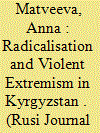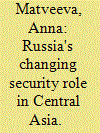| Srl | Item |
| 1 |
ID:
158973


|
|
|
|
|
| Summary/Abstract |
Central Asians have long been present within the ranks of organisations linked to the global jihad movement, but has there been an acceleration in their recruitment in recent years? There is growing evidence of substantial numbers of Central Asians (mostly Uzbeks and Tajiks) present in Syria in the ranks of the Islamic State and of a number of organisations linked to Al-Qaida. There is also growing evidence of recruitment inside Kyrgizstan and Tajikistan at least (as opposed as among Central Asian emigrants). The authors argue that distrust towards information provided by the Central Asian regimes should not blind analysts towards an emerging trend, which has substantial destabilising potential. The factors driving this recruitment also seem to be much more complex than a rejection of the authoritarianism of the ruling elites.
|
|
|
|
|
|
|
|
|
|
|
|
|
|
|
|
| 2 |
ID:
090573


|
|
|
|
|
| Publication |
2009.
|
| Summary/Abstract |
This essay engages with the dilemma of legitimisation of authoritarian states that move away from democracy by examining the cases of the Central Asian countries. These states have consolidated their independence since 1991, despite continuous internal tensions, and have withstood the impact of their turbulent neighbourhood. Achieving a degree of 'legitimacy' which fosters compliance with the existing domestic order, has made the rule of the current leaderships easier and has reduced the pressure on them to simply rely on coercion. Nevertheless, underlying challenges remain and will only grow in significance as these states struggle to balance the construction of state identities, elite cohesion and international recognition with the maintenance of some degree of internal legitimacy.
|
|
|
|
|
|
|
|
|
|
|
|
|
|
|
|
| 3 |
ID:
051121


|
|
|
|
|
| Publication |
Great Britain, Royal Institute of international Affairs, 1999.
|
| Description |
vi, 97p.
|
| Standard Number |
1862030626
|
|
|
|
|
|
|
|
|
|
|
|
Copies: C:1/I:0,R:0,Q:0
Circulation
| Accession# | Call# | Current Location | Status | Policy | Location |
| 042489 | 327.470479/MAT 042489 | Main | On Shelf | General | |
|
|
|
|
| 4 |
ID:
158395


|
|
|
|
|
| Summary/Abstract |
In this close analysis of radicalisation and violent extremism in Kyrgyzstan, Anna Matveeva argues that radicalisation is not a myth but a phenomenon taking root in the region. While the drivers of radicalisation are not entirely understood, its geographic and social patterns have become clearer. In Kyrgyzstan, it positively correlates with belonging to a Muslim minority group, and their representatives find jihadi ideas more attractive.
|
|
|
|
|
|
|
|
|
|
|
|
|
|
|
|
| 5 |
ID:
160953


|
|
|
|
|
| Summary/Abstract |
This essay discusses how Russia’s power manifested itself in relation to Western policies in its neighbourhood. It focuses on how Russia understands power, the way this understanding impacts the ideational and cultural influence that it projects, and how Moscow has applied a range of tools in Ukraine, Moldova and Belarus. It argues that Russia’s power projection cannot be understood without reference to its interactions with the West. The 2014 crisis in Ukraine brought greater consistency to Moscow’s approach, which has become more strategic, mixing different elements in pursuit of foreign policy objectives. Still, Moscow remains an anti-revisionist power beyond the Ukrainian case and continues to act as a status quo power in Europe where it has been adapting its strategies to a climate of hostile international relations. Russian soft power is a significant asset that needs to be recognised as a phenomenon in its own right and more clearly distinguished from the direct pursuit of state interests.
|
|
|
|
|
|
|
|
|
|
|
|
|
|
|
|
| 6 |
ID:
125085


|
|
|
|
|
| Publication |
2013.
|
| Summary/Abstract |
The paper explores Russia's role in security in Central Asia, which analysts interpreted as projection of hegemony. It argues that this role is changing and is shaped by a variety of factors, sometimes acting in contradiction to one another. Domestic agenda is influenced by the danger discourse on drugs and anti-migrant sentiment and urges to detach from Central Asia. Moscow maintains a military presence in the region but is uncertain if it has serious enough stakes to justify a robust approach to security. Refusal to intervene in Kyrgyzstan in 2010 serves as a potent case. Regional organisations echo the non-intervention stance. As a 'cost-benefit' approach to security gains momentum, the paper asks if a policy of selective engagement is emerging when only the issues threatening Russia directly will be addressed. The implication can be a security vacuum in the region, affected by ethnic conflict, inter-state disputes and the consequences of withdrawal from Afghanistan.
|
|
|
|
|
|
|
|
|
|
|
|
|
|
|
|